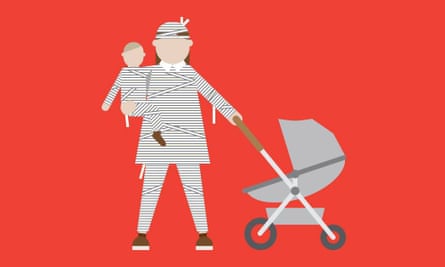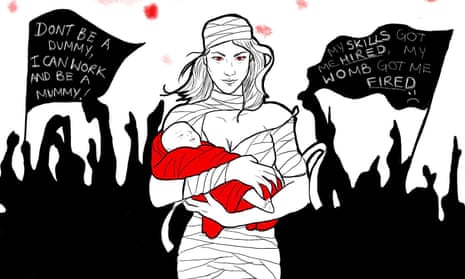This Halloween, hundreds of women dressed as bandaged-wrapped mummies will march for the rights of working mothers. Campaigners say that archaic legislation allows workplaces to discriminate; about one in nine new mothers said they have been forced out of their jobs, according to a 2015 report by the Equality and Human Rights Commission, which could mean as many as 54,000 women a year.
March of the Mummies was organised by Pregnant Then Screwed, a campaign group that provides a platform for women to anonymously share their discrimination stories, which also offers free legal support. Founder Joeli Brearley, 38, says: “We have been lobbying hard but it didn’t seem to be making a difference, so we thought we need to take to the streets and shout about it as loud as we can. The government has done nothing. In this time, as many as 70,000 women have lost their jobs. Less than 1% of women who encounter discrimination raise a tribunal claim. Access to justice is an enormous problem – and so is the time limit.”
Pregnant Then Screwed wants to see the time limit for bringing a claim raised from three months to six for pregnant and postpartum women. “For many new mums, you can barely get dressed every day, let alone mastermind a tribunal,” says Brearley. “If you are pregnant, the stress of doing something like that is enormous. It can risk the health of you and the baby.” An early day motion sponsored by Green party co-leader Caroline Lucas, who will speak at the march on 31 October, is also urging the government to increase the time limit for pregnancy and maternity discrimination claims.

Brearley, a former self-employed project manager, says a client cancelled her contract after she revealed she was expecting. “I went to parent groups and found out this sort of thing happens all the time,” she says. “It is really difficult for women to talk publicly about this as they often sign non-disclosure agreements. Others are worried they will be tarnished with the troublemaker brush, which could affect future careers.”
Stories of successful tribunal claims are rare. Charlotte Scoular, 32, said the great relationship she had with her past employers, “changed overnight” when she announced her pregnancy. She said her bonus and hours changed, and “any[thing] they could to be difficult, they did”. After having her daughter, Charlotte says: “I wanted to come back on exactly the same terms … but I was told: ‘There is no job for you.’” She describes her tribunal, which she won on two counts, as a “horrific ordeal”. Other counts were dismissed. “For me it wasn’t about the money, I needed someone in authority to tell me that I hadn’t done anything wrong.”
Lizzie Jarvis, 39, settled her case out of court. When she returned to work at an advertising company after her pregnancy ended in stillbirth, she was left out of meetings. But when she challenged bosses, she said she was told: “It’s probably hormones.” Now a mother of two, she says: “I was thinking I should leave, I can’t handle this, I am embarrassed. It took an external person to say: ‘You are being taken for a ride and you need to challenge it.’” She claimed she had been “demoted in all but title” and was granted a settlement.
Pregnant Then Screwed’s other aims include getting companies to report how many flexible working requests are made and granted, and giving fathers access to six weeks non-transferable paternity leave at 90% of their salary. It also wants subsidised childcare from six months old, rather than three years old, and for the self-employed to have access to statutory shared parental pay.
March of the Mummies supporter and TV presenter Helen Skelton, says her experience of motherhood and work at the BBC has been positive: “It has proved to me how flexible workplaces can be. I have taken my baby to work – everyone was so supportive. It breaks my heart that so many of my mummy friends are stressed out. It’s 2017: you would think we were clever enough to find a balance between work and family life.” The actor Manjinder Virk, who will also be speaking at the march, says: “We should not encourage an environment that allows women to be fearful of becoming a parent.”
March of the Mummies starts at 12pm on 31 October in Trafalgar Square, London, with simultaneous protests in Manchester, Cardiff, Glasgow, Belfast and Newcastle

Comments (…)
Sign in or create your Guardian account to join the discussion